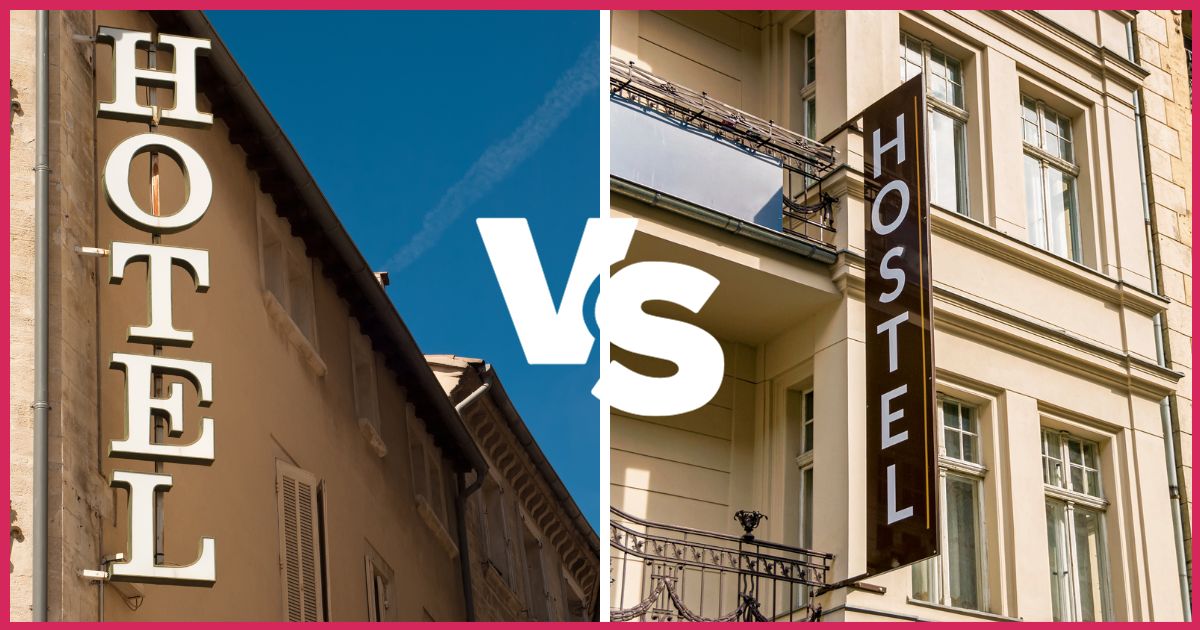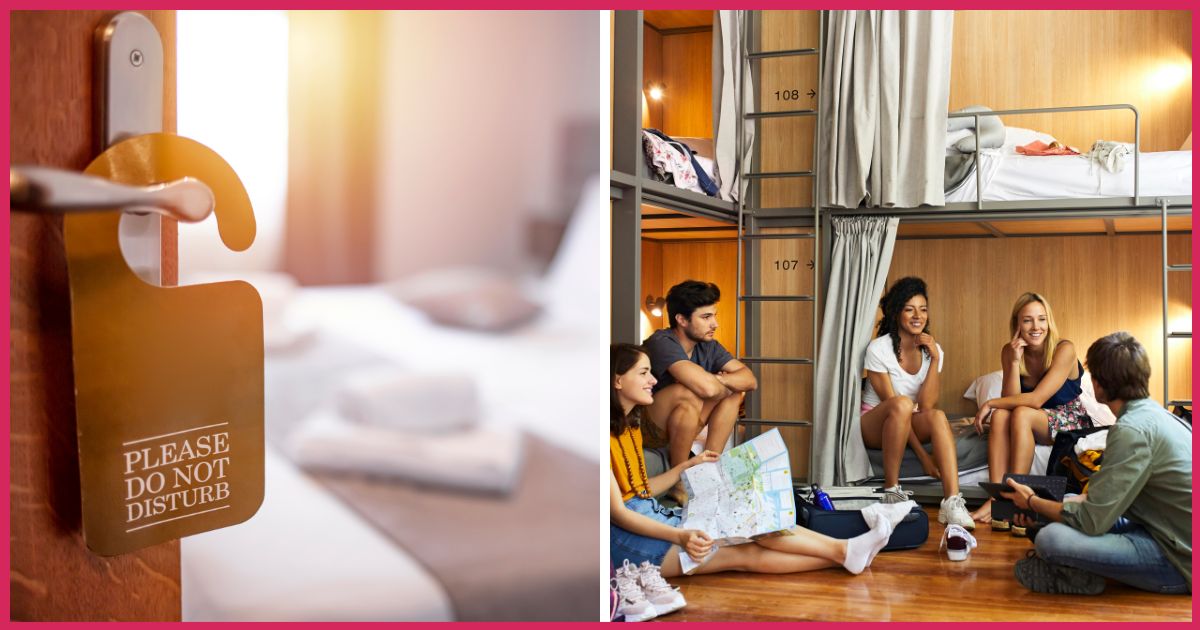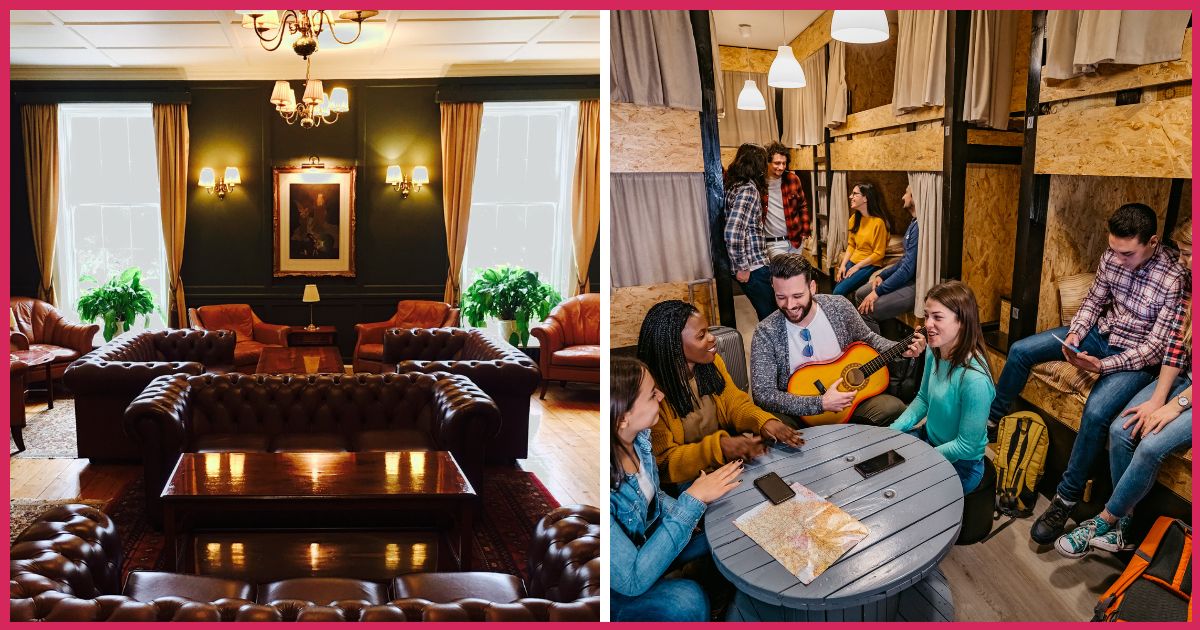15 Key Differences Between a Hotel and a Hostel
Choosing the right accommodation can make or break your travel experience. But what sets hotels apart from hostels?
Hotels cater to a diverse clientele, offering privacy, luxury, and personalised services. They're designed for comfort, providing a tranquil atmosphere suited to those on business trips or luxury holidays.
Hostels are the go-to for budget-conscious travellers. They foster a communal vibe, with shared spaces that encourage interaction among guests.
Understanding these differences is crucial for making the best choice for your needs. This article outlines the 15 key distinctions to help guide your decision.

1. Type of Accommodation
Hotels typically offer private rooms with en-suite bathrooms, catering to guests who prefer their own space and comfort. They range from budget-friendly inns to luxurious five-star establishments, each providing various levels of personal space, amenities, and services. The accommodation in hotels is more about the individual experience with a focus on privacy and personal service.
In contrast, hostels are known for their communal accommodations, which usually come in the form of dormitory-style rooms with shared bathrooms. They may also offer private or family rooms, but the essence of a hostel is to provide social, shared spaces which encourages interaction between guests.
The shared nature of the accommodations in hostels allows for lower costs and a more informal, community-oriented experience. Hostels are designed with the younger or more adventurous traveller in mind, offering a bustling social scene that hotels typically do not provide. This fundamental difference in accommodation type defines the distinct experiences each provides, with hotels leaning towards comfort and exclusivity, and hostels towards community and shared living.
2. Cost Comparison
Hostels are generally considered a more budget-friendly option compared to hotels. The cost difference is one of the most compelling factors for travellers on a tight budget. While hotels charge guests for individual rooms, hostels' pricing is often based on a per-bed basis in shared dormitories, which significantly reduces the nightly rate.
The affordability of hostels is not merely because of the shared sleeping quarters; it’s also due to the minimalistic services provided. Hotels, on the other hand, offer a wider range of services included in the room rate—like housekeeping, in-room entertainment, and toiletries—which contributes to the higher cost of staying in a hotel. The price for a night in a hotel will vary widely, with luxury establishments costing several times the amount one would pay for a hostel stay.
Moreover, while both accommodations may have seasonal price fluctuations, hotels typically have a higher markup during peak times than hostiles, reflecting their market position and the increased demand for private lodging options. Therefore, when it comes to cost, the choice between a hostel and a hotel can significantly impact a traveller's budget.
3. Privacy Levels

Privacy levels are a major point of divergence between hotels and hostels. Hotels are renowned for providing a high degree of privacy. Guests have their own rooms or suites, often with private bathrooms and amenities. The design of hotel rooms and the service provided are centred on ensuring guests' privacy is maintained, with features like "Do Not Disturb" signs, private balconies, and in-room dining services.
Conversely, hostels offer less privacy, with dormitory-style rooms being the norm. Beds in hostels are usually bunk beds in a shared room, with little to no barrier between them. While some hostels offer private or smaller rooms, the majority of sleeping quarters are designed to be shared, which means less personal space. Bathrooms in hostels are also shared among several guests, and the hostel culture promotes openness and community engagement over secluded living. For those who value privacy above all, a hotel is typically the preferred choice; whereas, for travellers looking to meet new people and don't mind sharing their living spaces, a hostel is ideal.
4. Room Configuration
Room configuration distinguishes hotels from hostels significantly. In a hotel, the standard offering is a private room with either a single, double, twin, or king-sized bed, catering to solo travellers, couples, or families. Many of these rooms are fitted with speciality zip-and-link beds that help change up a room configuration within minutes. Hotel rooms come with furniture and amenities such as televisions, wardrobes, desks, minibars, and sometimes even kitchenettes, depending on the hotel category.
Hostels, on the other hand, primarily offer shared dormitory rooms, which can accommodate anything from four to over twenty guests in bunk beds. The focus is on maximising space and occupancy, hence the preference for bunk beds and large shared rooms. Although private rooms can be available in hostels, these are the exception rather than the rule and are still simpler in terms of amenities and furnishings when compared to hotel rooms.
This difference in room configuration reflects the contrasting business models and target markets of hotels and hostels: hotels are designed for those seeking private and often more luxurious accommodations, while hostels cater to budget-conscious, sociable travellers who prioritise cost savings and social interactions over space and privacy.
5. Booking Structure
Booking structure in hotels and hostels reflects their divergent accommodation styles. Hotels typically offer room-based bookings where guests reserve a specific type of room for their exclusive use during their stay. This system is designed for privacy and individual service, allowing guests to choose from a range of room types and rates, often including the flexibility to accommodate changes and cancellations according to the hotel's policy.
Hostels, conversely, usually operate on a bed-based booking system, where individuals book a bed in a shared room rather than the room itself. This can mean that guests will share the room with strangers if travelling alone or in a smaller group than the room's full capacity. Hostel bookings are straightforward and often more rigid with fewer options for free cancellations or modifications, reflecting the hostel's focus on budget accommodation.
This structural difference in booking systems means that hotel guests enjoy a more tailored reservation experience, with a greater scope for personal preferences and requirements, whereas hostel guests opt for a 'no-frills', fixed-plan approach, which emphasises practicality and cost efficiency over customisation.
6. Target Audience

The target audience for hotels and hostels often differs markedly. Hotels are typically geared towards travellers who desire a level of comfort, privacy, and a more comprehensive range of services. This can include business travellers, couples, families, or any guest looking for a relaxing and private experience. The hospitality services, room amenities, and quieter environment cater to these expectations.
Hostels attract a different demographic, primarily consisting of younger travellers, backpackers, and those with a limited budget who value affordability and social interaction over comfort and privacy. They are a popular choice for solo travellers looking to meet like-minded individuals and for groups of friends exploring together. Hostels facilitate a communal travel experience, often with shared kitchens and common rooms, where interaction and community-building activities are encouraged. The social aspect of hostelling is as important as the accommodation itself, setting hostels apart from the traditional hotel offering.
7. Amenities and Facilities
Amenities and facilities in hotels and hostels diverge to reflect their target clientele and price points. Hotels usually provide a wide array of amenities, such as gyms, swimming pools, business centres, conference rooms, on-site restaurants, pillow menus and room service. Luxury hotels might feature spas, concierge services, and personalised guest experiences. These facilities are designed to add value to the guests' stay, offering convenience and exclusivity.
Hostels focus on basic, functional amenities tailored to budget-conscious travellers. Common amenities include shared kitchen facilities, laundry rooms, and communal lounging areas designed to foster a social atmosphere. Instead of the private amenities and services that hotels offer, hostels encourage a communal sharing environment, with resources like board games, book exchange corners, and often free Wi-Fi in common areas. These facilities are not just about practicality; they also aim to enhance the communal travel experience, encouraging guests to interact and share experiences.
8. Service and Staffing
Service and staffing in hotels are generally more extensive and specialised than in hostels. Hotels tend to employ a larger number of staff members, including front desk personnel, concierges, housekeepers, chefs, and maintenance workers, among others. The level of service in hotels can range from basic to highly personalised, where staff are available 24/7 to cater to guests’ needs, from room service to laundry and valet services.
Hostels, in comparison, operate with a leaner staffing model. Staff are typically multi-taskers, performing a variety of roles from reception to cleaning and sometimes even organising events. The service in hostels is more casual, with staff members often engaging with guests on a personal level, offering local travel tips and participating in social activities. The emphasis in hostels is on creating a friendly and inclusive environment, which can mean less emphasis on the formality and breadth of services found in hotels.
9. Atmosphere and Social Environment

Atmosphere and social environment are key differentiating factors between hotels and hostels. Hotels often promote a quiet, more reserved atmosphere tailored to rest and privacy. They cater to guests seeking a tranquil escape or a professional environment, with spaces designed for relaxation, work, or dining in a more secluded setting.
Hostels are synonymous with a vibrant, communal social scene. They are social hubs with common areas designed to facilitate interaction among guests from around the world. Hostels may organise social events, tours, and communal dinners, encouraging a sense of community and adventure. This communal atmosphere is a defining feature, making hostels particularly appealing to solo travellers and those looking to make connections on their travels. The lively environment of a hostel is one of its most attractive characteristics for a younger crowd and for those who are young at heart.
10. Location and Accessibility
Location and accessibility can differ between hotels and hostels, shaping the experience they offer to their guests. Hotels are frequently found in a variety of locations, from the heart of city centres to remote resort destinations. They are strategically situated to serve guests travelling for business or luxury vacations, offering easy access to major attractions, airports, and business districts.
Hostels tend to be located near transport hubs, like train and bus stations, and in areas that are popular with travellers for their nightlife, dining, or cultural scene. Their location is chosen with budget travellers in mind, providing convenient access to affordable local attractions and services. The choice of location for both hotels and hostels reflects their operational focus and the type of traveller they aim to attract, with convenience and accessibility being pivotal for hostels, and a broader choice of locale, often synonymous with comfort and exclusivity, being a feature of hotels.
11. Food and Dining Options

Food and dining options are a significant aspect where hotels and hostels diverge. Hotels often feature their own restaurants, cafes, and bars, which serve a variety of meals ranging from breakfast buffets to fine dining experiences. Room service is another hallmark of hotel dining, offering the convenience of food delivered directly to guest rooms.
Hostels typically do not operate full-scale restaurants but may offer communal kitchens where guests can prepare their own meals. This setup supports the hostel's community-focused and budget-friendly ethos. Some hostels may provide light meals, snacks, or a basic complimentary breakfast, with a focus on promoting interaction among guests in communal dining areas.
The self-service approach in hostels not only cuts down costs for the traveller but also enhances the social experience, as guests often find themselves cooking and sharing meals with fellow travellers.
12. Security Measures
Security measures often vary greatly between hotels and hostels, influenced by their accommodation style and guest services. Hotels typically employ a range of security measures, including CCTV, key card access to rooms and elevators, safety deposit boxes, and sometimes security personnel, ensuring a secure environment for guests and their belongings.
Hostels, while also concerned with security, approach it differently. Given the communal nature of their accommodations, hostels often provide lockers for personal belongings rather than in-room safes. Entrance to the hostel and dormitory rooms usually requires key or code access, and while CCTV may be used in common areas, there is generally less privacy and individual security.
The open environment means that while there is an inherent trust among guests, personal vigilance is also important. The lesser emphasis on sophisticated security systems in hostels reflects their informal atmosphere and a focus on community, as well as the need to keep costs low for travellers.
13. Events and Activities
Events and activities offered by hotels and hostels cater to the distinct character of each establishment. Hotels may provide guests with amenities such as fitness classes, spa services, and tour booking assistance, aimed at enriching the stay of their clientele within the comfort of the hotel premises. Some luxury hotels also host events like wine tastings, live music, and gala dinners, emphasising exclusivity and sophistication.
Hostels are known for their social calendars, often organising events and outings that encourage guest interaction and local exploration. These can include pub crawls, city tours, hiking trips, and communal dinners. The hostel’s event programming is generally more robust in terms of social activities, with the intent to create a friendly and interactive atmosphere for guests who are eager to meet new people and have shared experiences. This focus on community and adventure reflects the hostel culture and the value placed on memorable, social travel experiences.
14. Length of Stay
Length of stay typically varies between hotels and hostels, reflecting their differing service offerings and target markets. Hotels cater to both short-term and long-term guests, with the flexibility to provide nightly, weekly, or even extended stays. They are equipped to offer a comfortable experience regardless of the duration, accommodating everything from overnight business trips to long vacations.
Hostels, in contrast, are often associated with shorter stays, although many do accommodate long-term travellers, particularly in major travel destinations. The transient nature of hostel guests is conducive to their social dynamics, with many backpackers and budget travellers using hostels as a base for exploring an area before moving on. Some hostels offer discounts for longer stays, but the setup is less suited to those looking for the home comforts and stability that a hotel offers over an extended period. The difference in length of stay availability is indicative of the respective ethos and design of hotels and hostels.
15. Cancellation and Flexibility Policies
Cancellation and flexibility policies in hostels tend to be less forgiving than those in hotels. Hostels usually operate with stricter non-refundable booking policies, reflecting their low-cost model. These policies are particularly stringent during high season, where the demand for affordable beds is high, and the impact of cancellations on their operations is more significant.
Hotels generally provide greater leeway with cancellations, often allowing changes or cancellations without penalty up to a day before arrival. This flexibility is a service tailored to the needs of hotel guests, who may need to adjust travel plans last minute due to business or leisure itinerary changes. The disparity in cancellation policies highlights the balance each accommodation type strikes between service flexibility and pricing strategy, catering to their specific market segments.
Final Thoughts
The distinctions between hotels and hostels are marked and cater to the varied preferences of travellers. Whether it’s the level of privacy, the type of rooms, the booking structure, or the availability of facilities, each has its place in the travel industry.
Hotels offer a more personalised and private experience with a wide range of amenities suited to travellers looking for comfort and convenience.
Hostels, conversely, champion social interaction and budget-friendliness, appealing to those who prioritise experiences and community over luxury.
The decision between a hotel and a hostel will ultimately rest on what you value most in your travels—whether that be seclusion and service or camaraderie and cost savings. Understanding these key differences can help travellers make informed choices that align with their travel goals, ensuring a more enjoyable and fitting experience.




